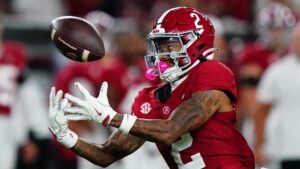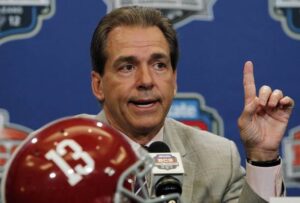
Breaking News: Alabama Crimson Tide Revoke $30 Million Contract with Ryan Williams, Demand Refund of Signing Bonus and Endorsement Advances
TUSCALOOSA, AL – In a shocking and unprecedented move, the University of Alabama’s athletic department has officially revoked a $30 million contract with star wide receiver Ryan Williams. The decision has sent shockwaves throughout the college football world, igniting a storm of controversy and speculation about what led to this abrupt termination. Alabama is reportedly seeking refunds of both Williams’ signing bonus and several endorsement advances he secured upon committing to the program.

A Star on the Rise
Ryan Williams, the highly-touted recruit out of Saraland High School, was considered a generational talent, one of the most electrifying players in high school football. With blazing speed, superb hands, and a football IQ well beyond his years, he was the crown jewel of Alabama’s 2024 recruiting class. Many analysts had already pegged him as a future NFL first-round draft pick before he even set foot on Alabama’s campus.
Williams’ recruitment was marked by a fierce battle between top-tier programs such as Georgia, LSU, Ohio State, and USC, but the Crimson Tide ultimately secured his commitment with a contract reportedly worth up to $30 million, primarily through lucrative Name, Image, and Likeness (NIL) deals. This was one of the largest NIL packages ever seen for a college athlete, and it immediately placed Williams in the national spotlight.
However, it appears that Williams’ meteoric rise has come to an abrupt and potentially disastrous halt.
The Decision to Revoke: What Happened?
The reasons behind Alabama’s stunning decision to revoke Williams’ contract have not yet been officially confirmed, but sources close to the situation have provided several potential factors that contributed to this dramatic development.
According to insiders, the decision may be tied to breaches of conduct clauses in both his NIL agreements and his contract with the university. While NIL deals provide athletes unprecedented opportunities to profit from their brand, they come with strings attached. Players are expected to uphold certain standards of behavior and represent both their university and corporate sponsors in a positive light.

It is believed that multiple incidents involving Williams’ off-field behavior may have violated these stipulations. Alleged incidents range from possible legal troubles to violations of team rules and university policies. While details are still emerging, the nature of the allegations has led Alabama to take swift and decisive action.
Legal Trouble and Conduct Violations?
One potential factor in Alabama’s decision to part ways with Williams could involve recent rumors about his involvement in off-the-field incidents. Unconfirmed reports suggest that Williams may have been involved in legal issues stemming from altercations in Tuscaloosa, which allegedly put his status with the team in jeopardy.

While no formal charges have been announced, multiple sources have claimed that Alabama’s athletic department was growing concerned about Williams’ increasing off-field distractions. These distractions, coupled with potential violations of team rules regarding curfews, missed practices, and behavior unbecoming of a student-athlete, may have pushed the university’s patience to the breaking point.
“Alabama’s program has a long-standing tradition of excellence, both on and off the field,” said one anonymous source close to the team. “The coaching staff and administration won’t hesitate to part ways with even the most talented players if they feel those individuals are not holding up their end of the bargain.”
Financial Fallout: Alabama Demands Refunds
Perhaps the most staggering aspect of this story is Alabama’s demand for refunds of Ryan Williams’ signing bonus and endorsement advances. The Crimson Tide reportedly distributed a sizable upfront payment to Williams as part of his NIL deal, as well as facilitating high-profile endorsement contracts with major brands.
Alabama’s athletic department is now requesting the repayment of millions of dollars, citing breach of contract and failure to meet the expectations laid out in his agreements. This demand sets up a potentially lengthy and contentious legal battle between Williams, his representatives, and the university. It is unclear whether Williams’ NIL sponsors, some of whom include national brands, will also seek to recoup any of their investments.
For Williams, the financial repercussions could be catastrophic. Having already received substantial payouts based on his projected future success, the reversal of these payments could lead to significant personal financial strain. The young athlete now faces the daunting prospect of having to return funds that have already been spent or invested.

The Role of NIL: High Stakes for Young Athletes
The NIL era has dramatically altered the landscape of college sports, with star athletes like Ryan Williams benefiting from massive contracts that, until recently, would have been unimaginable for student-athletes. However, as this situation illustrates, these contracts come with significant responsibilities and high expectations.
Critics of NIL have long warned of the potential dangers of young athletes being thrust into the world of multimillion-dollar deals without the necessary experience or maturity to handle the pressures that come with such wealth. The case of Ryan Williams may fuel those arguments.
“This is the dark side of the NIL revolution,” said one industry analyst. “Yes, it’s great that athletes can now profit from their talent and marketability, but we’re also seeing the consequences of throwing huge sums of money at teenagers who are still growing and maturing. The expectations on them are enormous, and not all of them are going to handle that pressure well.”
In the aftermath of this incident, there is likely to be renewed debate about how NIL deals are structured, particularly for incoming freshmen who have yet to prove themselves on the college stage. Many believe that more safeguards need to be put in place to protect both the athletes and the universities from situations like this one.
Impact on Alabama Football
The sudden termination of Ryan Williams’ contract is sure to have ripple effects on Alabama’s football program. As one of the top recruits in the nation, Williams was expected to be an immediate contributor for the Crimson Tide, possibly filling the void left by departing star receivers. His talent, speed, and versatility were seen as perfect fits for Alabama’s high-powered offense.
Without Williams, Alabama’s receiving corps is left with fewer proven playmakers. While Nick Saban has a reputation for reloading with elite talent every year, losing a player of Williams’ caliber before he even plays a down is a significant blow to the team’s depth chart.
Nick Saban’s Response: A Matter of Principle
Alabama head coach Nick Saban has yet to issue a formal statement on the situation, but those familiar with the coach’s philosophy suggest that this decision was likely made with Saban’s full backing. Known for running a disciplined and tightly controlled program, Saban has consistently preached the importance of accountability and maintaining high standards both on and off the field.
In past seasons, Saban has made it clear that no player, regardless of talent or status, is above the team or the principles that guide Alabama football. It is likely that, after reviewing Williams’ conduct, Saban and the university felt that parting ways with the young star was in the best interest of the program.
“Nick Saban doesn’t tolerate distractions,” said a former Alabama assistant coach. “He’s all about discipline and focus. If a player isn’t willing to buy into that culture, Saban will move on, no matter how talented they are.”
Ryan Williams’ Next Move
For Ryan Williams, the fallout from this situation could be career-defining. At just 18 years old, Williams now faces a crossroads that will determine whether he can recover from this setback and resurrect his promising football career.
One potential option for Williams is to transfer to another program. While the contract dispute with Alabama may complicate this process, it is not unprecedented for highly recruited athletes to bounce back after parting ways with their original team. Several programs around the country would undoubtedly jump at the chance to add a talent like Williams to their roster, assuming his off-field issues can be resolved.
Another option for Williams is to explore professional opportunities, either by entering the NFL draft early or by seeking playing opportunities in alternative leagues. However, his eligibility and standing with the NCAA may be jeopardized depending on how the contract dispute with Alabama is resolved.
In the short term, Williams’ immediate priority will be navigating the legal and financial challenges that have arisen from Alabama’s decision. He and his legal team will likely contest the university’s demand for refunds, potentially setting up a legal battle that could drag on for months or even years.
The Broader Implications for College Sports
Leave a Reply